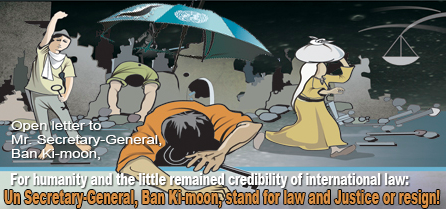Tag: Ban Ki-moon
-
Un Secretary-General, Ban Ki-moon, stand for law and justice or resign!
7th August 2014 | Badil | Occupied Palestine For humanity and the little remained credibility of international law: Un Secretary-General, Ban Ki-moon, stand for law and justice or resign! Mr. Secretary-General Ban Ki-moon, We, the under signed Palestinian human rights and community-based organizations are extremely disappointed by your performance, notably by your biased statements, your failure to act, and…
-
Ban Ki-moon: “The occupation that started in 1967 is morally and politically unsustainable”
30 March 2011 | Palestine News Network UN Secretary-General Ban Ki-moon called for a halt to Israel’s settlement building in the Palestinian territories, an end to all expressions of violence and the punishment of those perpetrating it, adding that Israel’s occupation is morally and politically unsustainable. “Time is of the essence in realizing the two-state…
-
Ban Ki-moon’s moral failure
Hasan Abu Nimah | Electronic Intifada 6 May 2009 Late last week, according to the BBC Arabic news website, a report was submitted to the United Nations Secretary-General Ban Ki-moon about the scale of destruction Israel inflicted on UN installations in Gaza. This was also mentioned on a BBC news bulletin on 1 May, but…

